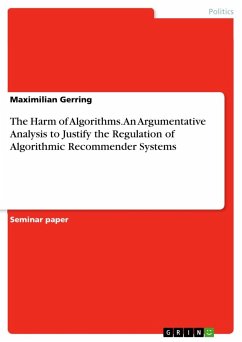Seminar paper from the year 2022 in the subject Politics - Political Theory and the History of Ideas Journal, grade: 1,7, University of Frankfurt (Main) (Institut für Politikwissenschaften), course: Political Philosophy & Public Policy, language: English, abstract: The goal of the following paper is to develop a defence for the regulation of algorithmic recommender systems. After demonstrating the harmful effects that algorithmic recommender systems can have, I will build an argument for regulating these systems in order to protect individuals and minority groups from discrimination in social media. In chapter 4, I will address two arguments that act as a foundation against regulating such systems and show that these arguments are not able to present convincing points. In chapter 5, I will bring my argumentation with another pro- regulation argument to an end and finish my paper with a conclusive summary. Hate, misinformation and political manipulation have grown to become a problem of social scale in the online media of our time. This can have a negative impact outside the digital world. Despite the fact that it can only be the user himself who initially introduces hate and agitation into a discussion, the large operators of social media platforms, namely Facebook, Twitter or Google, are also to be held responsible for the fact that hate can spread on their platforms as quickly as it was not possible in classic media before. Their business model aims to keep users on the platform for a long period of time in order to sell their advertising space as profitably as possible. For this purpose, most of these platform companies use algorithmic recommender systems to push content or products (like YouTube's "Next Videos" or Facebook's "Recommended Groups") which are considered relevant for the user. Although the platforms, if we follow their argumentation, want to make the user experience with these systems as positive as possible, the practice of providing the user with information that reflects his or her interests leads to the fact that if the user deals with already critical topics these also appear repeatedly in their timeline. This sometimes leads to users being encouraged in their opinion and creates network effects through which users encounter other users with the same opinion or inform themselves about similar topics. In addition to that, personalised advertising whose business model is also based on the same critical algorithmic recommender systems, can cause particular harm in a political context.








